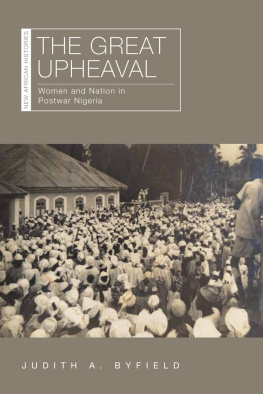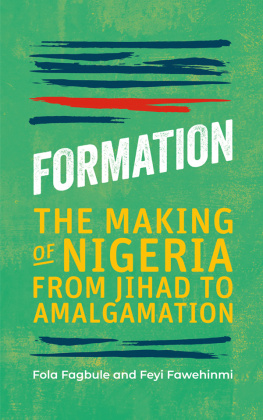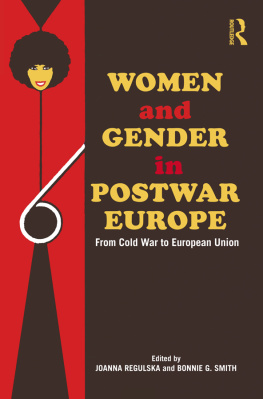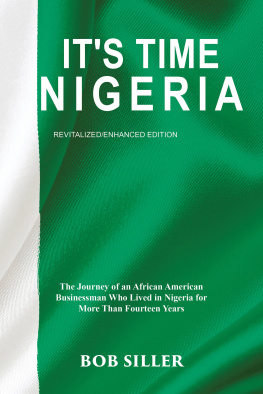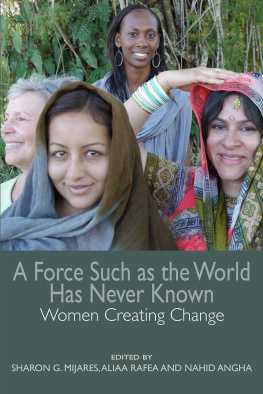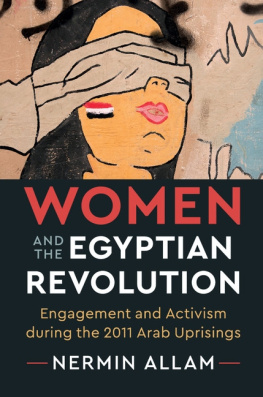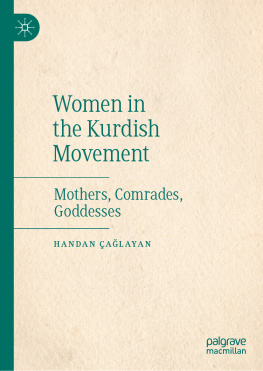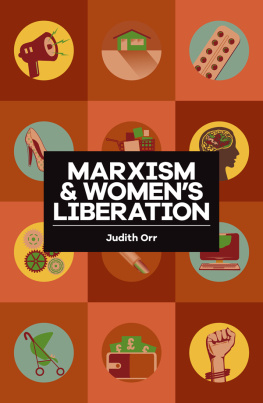NEW AFRICAN HISTORIES
SERIES EDITORS: JEAN ALLMAN, ALLEN ISAACMAN, AND DEREK R. PETERSON
David William Cohen and E. S. Atieno Odhiambo, The Risks of Knowledge
Belinda Bozzoli, Theatres of Struggle and the End of Apartheid
Gary Kynoch, We Are Fighting the World
Stephanie Newell, The Forgers Tale
Jacob A. Tropp, Natures of Colonial Change
Jan Bender Shetler, Imagining Serengeti
Cheikh Anta Babou, Fighting the Greater Jihad
Marc Epprecht, Heterosexual Africa?
Marissa J. Moorman, Intonations
Karen E. Flint, Healing Traditions
Derek R. Peterson and Giacomo Macola, editors, Recasting the Past
Moses E. Ochonu, Colonial Meltdown
Emily S. Burrill, Richard L. Roberts, and Elizabeth Thornberry, editors, Domestic Violence and the Law in Colonial and Postcolonial Africa
Daniel R. Magaziner, The Law and the Prophets
Emily Lynn Osborn, Our New Husbands Are Here
Robert Trent Vinson, The Americans Are Coming!
James R. Brennan, Taifa
Benjamin N. Lawrance and Richard L. Roberts, editors, Trafficking in Slaverys Wake
David M. Gordon, Invisible Agents
Allen F. Isaacman and Barbara S. Isaacman, Dams, Displacement, and the Delusion of Development
Stephanie Newell, The Power to Name
Gibril R. Cole, The Krio of West Africa
Matthew M. Heaton, Black Skin, White Coats
Meredith Terretta, Nation of Outlaws, State of Violence
Paolo Israel, In Step with the Times
Michelle R. Moyd, Violent Intermediaries
Abosede A. George, Making Modern Girls
Alicia C. Decker, In Idi Amins Shadow
Rachel Jean-Baptiste, Conjugal Rights
Shobana Shankar, Who Shall Enter Paradise?
Emily S. Burrill, States of Marriage
Todd Cleveland, Diamonds in the Rough
Carina E. Ray, Crossing the Color Line
Sarah Van Beurden, Authentically African
Giacomo Macola, The Gun in Central Africa
Lynn Schler, Nation on Board
Julie MacArthur, Cartography and the Political Imagination
Abou B. Bamba, African Miracle, African Mirage
Daniel Magaziner, The Art of Life in South Africa
Paul Ocobock, An Uncertain Age
Keren Weitzberg, We Do Not Have Borders
Nuno Domingos, Football and Colonialism
Jeffrey S. Ahlman, Living with Nkrumahism
Bianca Murillo, Market Encounters
Laura Fair, Reel Pleasures
Thomas F. McDow, Buying Time
Jon Soske, Internal Frontiers
Elizabeth W. Giorgis, Modernist Art in Ethiopia
Matthew V. Bender, Water Brings No Harm
David Morton, Age of Concrete
Marissa J. Moorman, Powerful Frequencies
Ndubeze Mbah, Emergent Masculinities
Patricia Hayes and Gary Minkley, editors, Ambivalent
Mari K. Webel, The Politics of Disease Control
Kara Moskowitz, Seeing Like a Citizen
Jacob S. T. Dlamini, Safari Nation
Cheikh Anta Babou, The Muridiyya on the Move
Alice Wiemers, Village Work
Judith A. Byfield, The Great Upheaval
Laura Ann Twagira, Embodied Engineering
Ohio University Press, Athens, Ohio 45701
ohioswallow.com
2021 by Ohio University Press
All rights reserved
To obtain permission to quote, reprint, or otherwise reproduce or distribute material from Ohio University Press publications, please contact our rights and permissions department at (740) 593-1154 or (740) 593-4536 (fax).
Earlier versions of chapters in this book were published in the following articles:
Taxation, Women, and the Colonial State: Egba Womens Tax Revolt was originally published in Meridians, vol. 3, pp. 25077. (c) 2003, Smith College. All rights reserved. Republished by permission of the copyright holder, and the present publisher, Duke University Press. www.dukeupress.edu.
Feeding the Troops: Abeokuta (Nigeria) and World War II was originally published in African Economic History 35 (2007): 7787 2007 by the Board of Regents of the University of Wisconsin System. Reprinted by courtesy of the University of Wisconsin Press.
Judith Byfield, Women, Rice, and War: Political and Economic Crisis Wartime Abeokuta (Nigeria), Africa and World War II (Cambridge: Cambridge University Press, 2015), 14765, 2015 Cambridge University Press. Reproduced with permission of the Licensor through PLSclear.
Printed in the United States of America
Ohio University Press books are printed on acid-free paper

29 28 27 26 25 24 23 22 21 5 4 3 2 1
Library of Congress Cataloging-in-Publication Data
Names: Byfield, Judith A. (Judith Ann-Marie), author.
Title: The great upheaval : women and nation in postwar Nigeria / Judith A. Byfield.
Other titles: New African histories series.
Description: Athens : Ohio University Press, 2019. | Series: New African histories | Includes bibliographical references and index.
Identifiers: LCCN 2019031415 | ISBN 9780821423974 (hardcover) | ISBN 9780821423981 (paperback) | ISBN 9780821446904 (pdf)
Subjects: LCSH: WomenPolitical activityNigeriaAbeokutaHistory--20th century. | WomenNigeriaAbeokutaEconomic conditions20th century. | WomenNigeriaAbeokutaSocial conditions20th century. | NationalismNigeriaHistory20th century. | NigeriaHistory1900-1960. | NigeriaPolitics and governmentTo 1960.
Classification: LCC DT515.9.A17 B94 2019 | DDC 966.9230904dc23
LC record available at https://lccn.loc.gov/2019031415
Acknowledgments
This book has been germinating a long time. It started as my original dissertation proposal. However, as I probed the questions that seemed relevant to understanding the relationship between the 1947 womens tax revolt and nationalism, those questions became other projectsThe Bluest Hands: A Social and Economic History of Women Dyers in Abeokuta (Nigeria), 18901940 (Heinemann, 2002) and Africa and World War II (Cambridge, 2015). The research and writing also had to be fit around teaching, advising, health issues, and the passing of many people near and dear to my heart. The long incubation period afforded many advantages. It allowed me to explore new literature, reread old classics with new questions and new eyes, and engage the stimulating work of a new generation of Africanist historians. Ultimately, this book is much better than what I originally envisioned.
While research and writing are largely singular endeavors, we are pushed to think more deeply or to question our assumptions as we share our ideas with students, friends, and colleagues. I have a special place in my heart for the students in my seminar on nationalism and decolonization in Africa. Their engagement with the readings helped me more than they can appreciate. I had the good fortune to be surrounded by generous, thoughtful colleagues who never hesitated to probe, ask difficult questions, or cheer me on as I wrestled with each chapter. I gained tremendously from the multiple conversations that began as a writing group and turned into fun-filled, raucous meals. For those moments, I especially thank Deborah Gray-White, Carolyn Brown, Natalie Byfield, Wanda Hendricks, and Donna Murch. I experienced similar boundary crossings and lively meals with participants of the Black Womens Intellectual History Project organized by Mia Bay, Farah J. Griffin, Martha S. Jones and Barbara D. Savage. Invigorating discussions also followed presentations to Columbia Universitys Women and Society Seminar and the Seminar in Contemporary African History. Those times were buttressed by the continued love and friendships forged at Dartmouth College with Deborah K. King, Bryant Ford, Lourdes Guttierez-Najera, Celia Naylor, Annelise Orleck, and Craig Wilder. At Cornell University, I worked with wonderful colleagues in the History Department, the Feminist, Gender, and Sexuality Studies Program, and Africana Studies. I have valued the strong friendships of Ed Baptist, Sherman Cochran, Naminata Diabate, Grant Farred, Maria Cristina Garcia, Sandra Greene, Durba Ghosh, Salah Hassan, Saida Hodzic, Russell Rickford, Rich Richardson, No-liwe Rooks, Barry Strauss, Olfmi Tw, Eric Tagliacozzo, Robert Travers, and Penny Von Eschen. Our administratorsBarb Donnell, Treva Levine, Renee Milligan, Claire Perez, and Judy Yonkinhelped me stay in compliance and in good humor.

